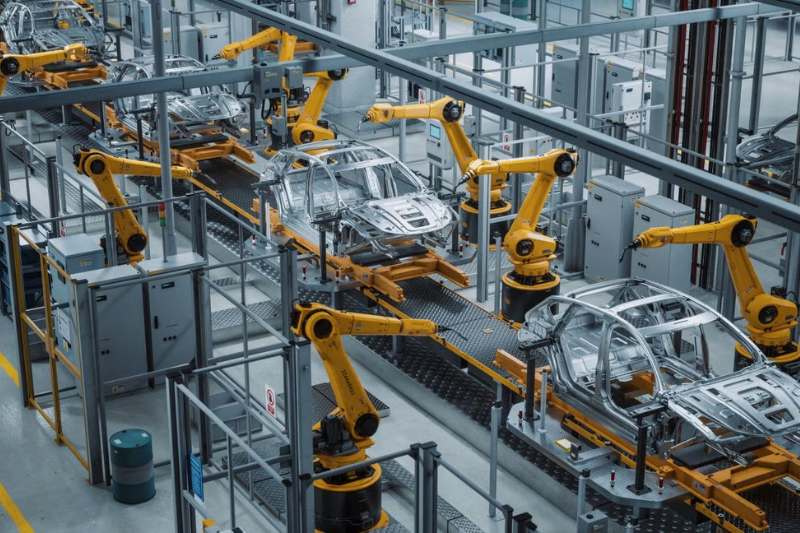
In May 2025, the UK car industry suffered a historic setback. Vehicle production fell sharply, plunging by 32.8% year-on-year. That made it the lowest May output since 1949, not counting the COVID-19 lockdown in 2020.
This drop isn’t just a statistical blip—it signals deeper trouble for the UK auto manufacturing sector, global trade ties, and the economy. Let’s break down the reasons behind this record decline and what lies ahead.
The Society of Motor Manufacturers and Traders (SMMT) reported that only 49,810 vehicles were produced in the UK in May 2025. This includes 47,723 passenger cars and 2,087 commercial vehicles.
Car output alone fell by 31.5%, while commercial vehicle production crashed by over 53.6%. These are the lowest May car production figures in 76 years.
One of the biggest reasons behind this production slump was the 25% US tariff on UK-made cars introduced in March 2025. These tariffs, applied under Section 232, struck hard at one of the UK’s largest car export markets.
As a result, UK car exports to the US fell by more than 50%. The US, which once accounted for nearly 18% of UK car exports, now represents only 11%. Major British automakers like Jaguar Land Rover and Aston Martin paused US-bound shipments altogether.
This massive export disruption led to excess stock, halted production lines, and reduced factory shifts.
Many UK-based automotive plants faced planned shutdowns and downtime due to model changeovers. These were part of long-term transitions to electric vehicle (EV) production.
Stellantis’ Luton facility, among others, temporarily closed operations to retool for EVs. While these updates are vital for the future of the industry, they caused a sharp drop in car manufacturing output in Q2 2025.
These disruptions were felt across the supply chain, affecting parts suppliers, transport, and labor planning.
The UK EV mandate, rolled out in 2025, requires all manufacturers to meet strict quotas on zero-emission vehicle production. This regulation aims to speed up the shift toward clean transport.
However, many automakers were unprepared for the sudden quota enforcement. As a result, supply chains faced delays, component shortages hit production lines, and older vehicle models were phased out before replacements were ready.
This created a gap in production capacity just as demand for EVs remains inconsistent.
The car industry’s decline mirrors broader weakness in the UK manufacturing sector. The economy shrank by 0.3% in April 2025, with overall manufacturing output falling by 0.6%, according to the Office for National Statistics.
High energy prices, interest rate hikes, and tax pressures have created headwinds for manufacturers across industries. The automotive sector in the UK, already grappling with trade and transition pressures, took the hardest hit.
UK car manufacturers depend heavily on exports, with nearly 80% of vehicles made in Britain shipped overseas. This makes the industry highly vulnerable to foreign policy changes, tariffs, and customs delays.
Exports to the European Union also fell by over 25% in May 2025, compounding the damage caused by US tariffs. Meanwhile, domestic demand remained weak due to inflation and cautious consumer spending.
The result was widespread production slowdowns and excess inventory in the domestic market.
To address the tariff crisis, the UK secured a new trade agreement with the United States in June 2025. The deal, taking effect on June 30, 2025, reduces the tariff on UK-made vehicles from 25% to 10% for the first 100,000 cars exported to the US each year.
This agreement is expected to reignite US-bound vehicle shipments and stabilize production in the second half of 2025. Industry leaders welcomed the deal as a critical lifeline for UK car export recovery.
The UK government launched an industrial strategy in mid-2025 aimed at supporting carmakers during this transition. The plan includes:
Reducing industrial energy bills to improve factory profitability
Funding EV infrastructure and domestic battery production
Easing trade regulations and post-Brexit customs procedures
This comprehensive strategy is expected to help bring back confidence in UK automotive manufacturing and attract long-term investments.
The first half of 2025 has been brutal for the UK car industry. But with new trade agreements, government support, and EV supply chains stabilizing, experts predict a gradual rebound in UK car production by late 2025.
It won’t be easy. Recovery depends on how quickly manufacturers can ramp up output, especially of EVs, and whether consumer demand picks up.
Still, the foundations are being laid for a more resilient and modern UK auto industry.
The UK car production drop in 2025 was caused by a mix of trade tariffs, EV transitions, factory shutdowns, and regulatory pressure. The May output hitting a 76-year low is a wake-up call for industry leaders and policymakers alike.
Yet with new trade deals and a focus on electric mobility, the second half of the year offers hope. If the sector adapts quickly, the worst may be over, and a sustainable recovery could begin.